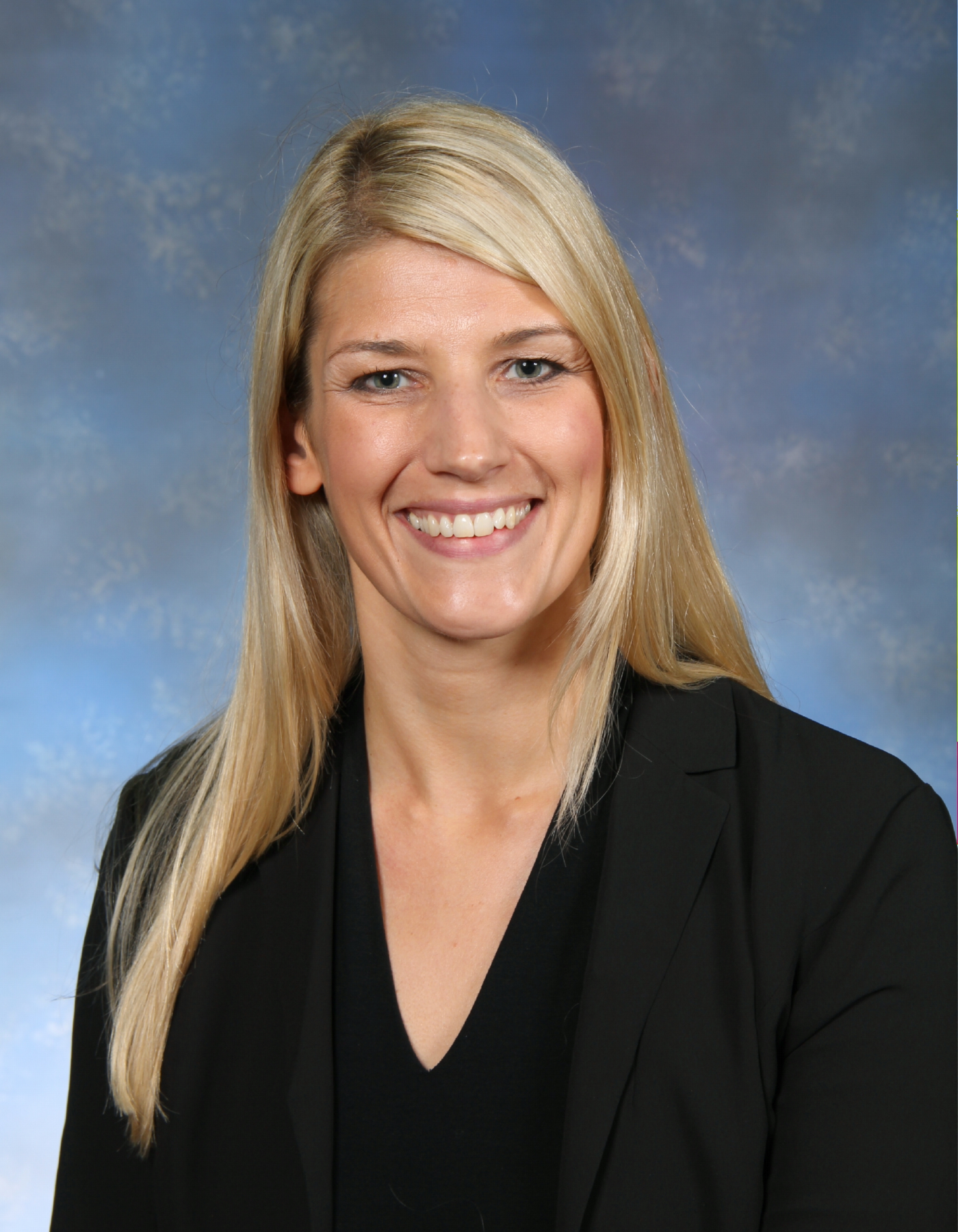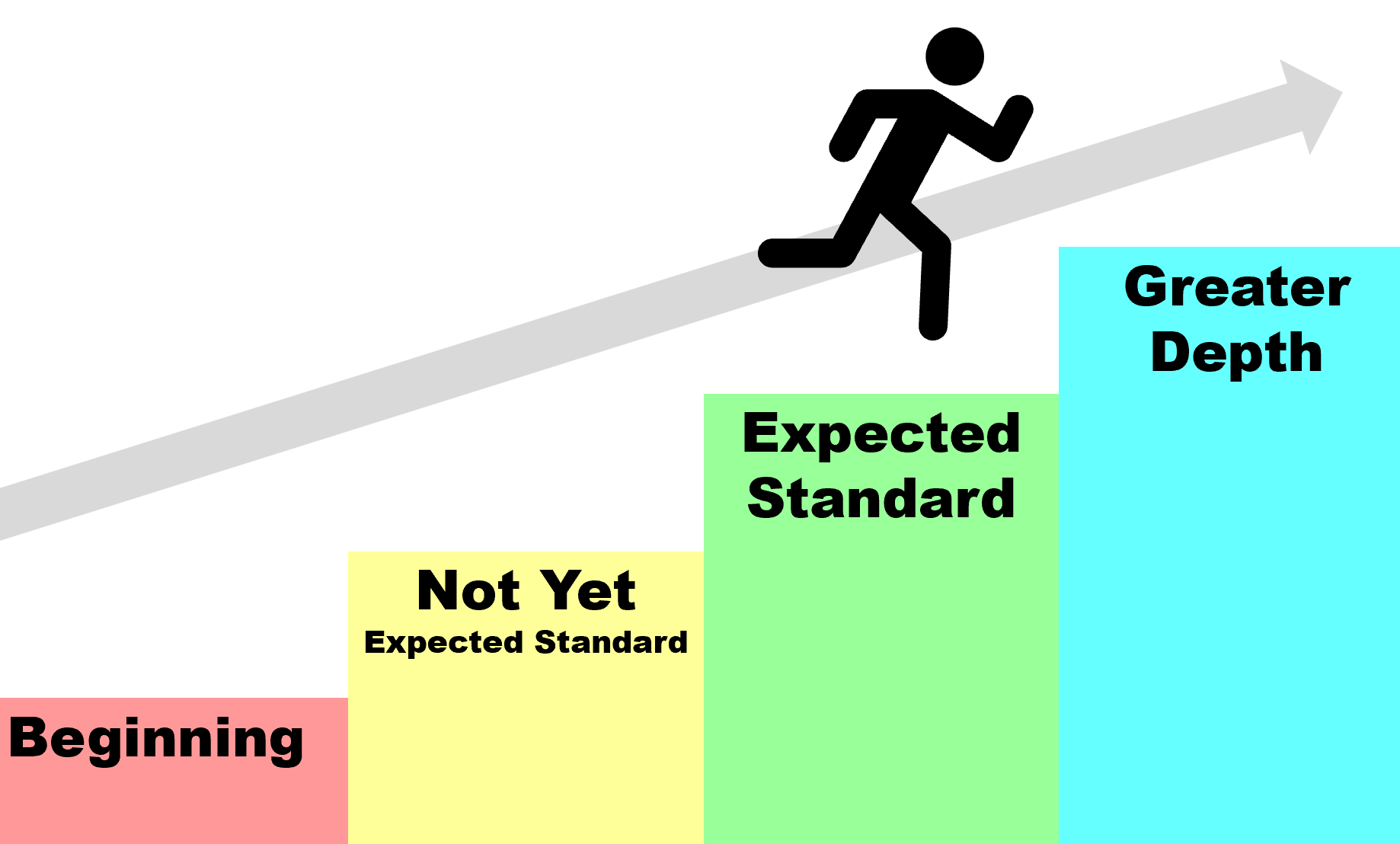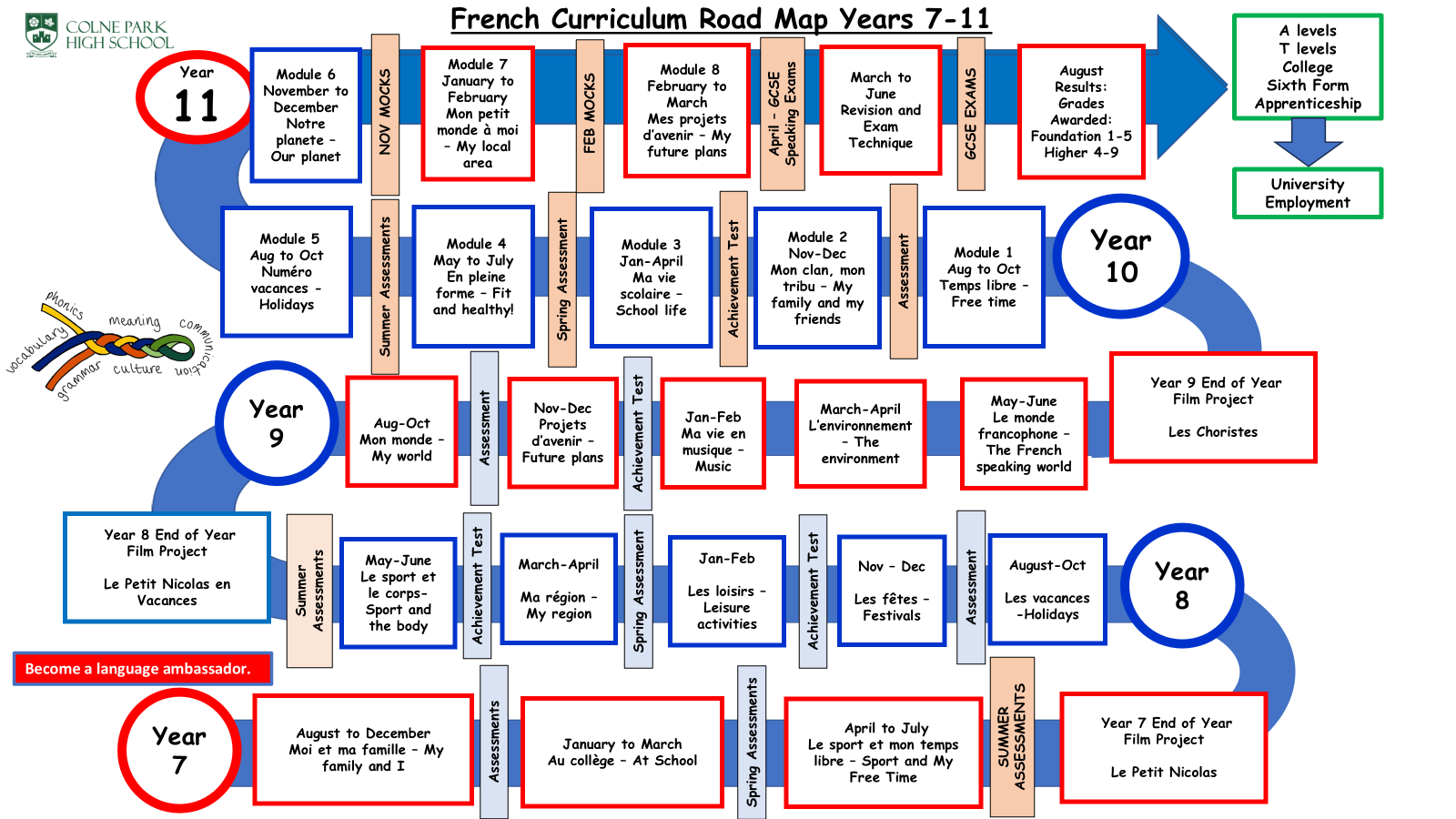Modern Foreign Languages

Ms Mitchell - Trust Lead for MFL
Modern Foreign Languages
Bonjour! Nǐ hǎo !
Hello, and a warm welcome to the languages department at Colne Park High School. At Park High School, students have the wonderful opportunity to learn French and Mandarin.
We place a very high value on language learning and developing cultural awareness. We are an incredibly dedicated department, committed to ensuring every child achieves the best possible outcomes in language learning throughout their time here. We teach high-quality, ambitious lessons that enable students to develop their understanding of phonics, vocabulary and grammar whilst also developing their listening, reading, writing, speaking and translation skills and broadening students’ horizons.
Vision
Our vision is to inspire all students to see the value in learning a Modern Foreign Language; to develop students who have a love of language learning and to enable students to reach high levels of academic achievement. We aim to challenge students to use language creatively and spontaneously and to develop their cognitive and communication skills. We also endeavour to encourage students to explore the wider world and have an appetite to experience different cultures. Our vision is to provide a curriculum model that is deeply rooted in the concept that the curriculum is knowing more and remembering more.
Intent
The overall aim of the curriculum is to ensure that students gain the essential knowledge for Modern Foreign Languages MFL (French/Mandarin) so that students can communicate effectively in the language they are learning. Essential knowledge in MFL is phonics, vocabulary and grammar and our curriculum is carefully planned around the progression of these ‘3 pillars’ of knowledge. Students have the opportunity to go from novice to expert language learners over years 7 to 11 in French and across KS2, KS3 and KS4 in Mandarin. As language becomes more automised students can produce more detailed and accurate responses manipulating language to narrate events and say something new.
Students will also develop ‘cultural capital’ by having an awareness of other cultures such as French cultures, the French speaking world and Chinese culture through exposure to authentic materials such as leaflets, news articles, videos, and literary texts.
The 3 pillars; phonics, vocabulary and grammar are reinforced throughout the entire curriculum through extensive planned practise within the skill areas of listening, speaking (spontaneously, without notes), reading, writing, dictation and translation. Students build up the essential knowledge required to communicate about a range of age-appropriate topic areas. Students are encouraged to use target language as the main means of communication as frequently as is appropriate. Our intent is based on the core guiding principles as outlined in the National Curriculum Programme of Study for MFL.
Our MFL curriculum is designed in a way that allows pupils to reflect on their own progress overtime whilst reinforcing students’ awareness of SMSC, careers and academic language as per the school’s rich broadening horizons agenda. Whilst our curriculum reflects the presence of languages in the local area; we also place importance on opening students’ eyes to the wider world. Topics are studied within the context of the students’ home country and that of the countries and communities where French and Mandarin are spoken.
Assessment and Curriculum Related Expectations
KS3
Years 7-9 French
There are half-termly assessments to give students the opportunity to show off the listening, reading, writing and speaking skills that they have developed over time. We aim to develop students to become spontaneous speakers and therefore try to create a culture whereby French and Mandarin are used as much as possible to communicate in the classroom.
Judgements based on Curriculum Related Expectations (CREs)
Judgements will be made by the French teacher based on assessments and classwork on the progression in the curriculum at the end of the Autumn, Spring and Summer Term. Teachers will report home progression in the French curriculum in terms of Beginning, Not Yet Expected Standard, working at the Expected Standard and working at Greater Depth.

Listening and Speaking:
CRE 1 - To listen attentively to present tense spoken French and understand and answer questions on familiar topics.
CRE 2 – To use phonics to develop accurate French pronunciation when reading aloud and in conversations.
CRE 3 – To use connectives to create extended sentences to speak about topics using familiar vocabulary, and high frequency present tense language structures from memory.
CRE 4 – To express and justify opinions, respond to others, and seek clarification by asking and answering questions.
CRE 5 – Students should be able to listen to extracts which refer to past and present events and speak using time markers and the past and present tense with accurate pronunciation.
CRE 6 - Students should be able to listen to extracts which refer to past, present and future events and speak using the past, present and future tense using increasingly complex language to narrate events.
Reading and Writing:
CRE 1 - To read and understand simple words, phrases, and short written texts in French in the present tense. Write and spell sentences and words accurately in a dictation task.
CRE 2 – To broaden vocabulary and attempt to understand the meaning of new French words to enable students to translate texts from French to English and English into French.
CRE 3 - To write in the present tense from memory, adapt the language to create new sentences, use connectives, and express simple ideas and opinions clearly.
CRE 4 - To understand and apply basic grammar rules such as feminine, masculine, plural, adjective agreement, negative structures and the conjugation of present tense high-frequency verbs.
CRE 5 – To enhance cultural capital through accessing authentic French resources from the French speaking world such as news articles, recipes, poems, songs and films.
CRE 6 – To read, understand and write texts of increasing length which successfully refer to past and present events.
CRE 7 – Students should be able to read extracts which refer to past, present and future events and write using the past, present and future tense using increasingly complex language to narrate events.
Year 7 French
Term 1 – My family and I
Listening & Speaking CREs 1,2,3 Reading & Writing CREs 1,2,4,5
Term 2 – At school
Listening & Speaking CREs 1,2,3,4 Reading & Writing CREs 1,2,3,4,5
Term 3 – Sport and Hobbies
Listening & Speaking CREs 1,2,3,4 Reading & Writing CREs 1,2,3,4,5
Year 8 French
Term 1 – Holidays & Festivals
Listening & Speaking CREs 1,2,3,4,5 Reading & Writing CREs 1,2,3,4,5,6
Term 2 – Leisure and My Neighbourhood
Listening & Speaking CREs 1,2,3,4,5 Reading & Writing CREs 1,2,3,4,5,6
Term 3 – Sport & Healthy Lifestyles
Listening & Speaking CREs 1,2,3,4,5 Reading & Writing CREs 1,2,3,4,5,6
Year 9 French
Term 1 – My world and Future Plans
Listening & Speaking CREs 1,2,3,4,5,6 Reading & Writing CREs 1,2,3,4,5,6,7
Term 2 – Music and The Environment
Listening & Speaking CREs 1,2,3,4,5,6 Reading & Writing CREs 1,2,3,4,5,6,7
Term 3 – The French Speaking World
Listening & Speaking CREs 1,2,3,4,5,6 Reading & Writing CREs 1,2,3,4,5,6,7
KS3 Mandarin
Judgements will be made by the Mandarin teacher based on assessments and classwork on the progression in the curriculum at the end of the Autumn, Spring and Summer Term. Teachers will report home progression in the Mandarin curriculum in terms of Beginning, Not Yet Expected Standard, working at the Expected Standard and working at Greater Depth.

Listening and Speaking
CRE 1 – Students should be able to join in with choral repetition, songs, and rhymes to practise pronunciation, the 4 tones, and key vocabulary.
CRE 2 – Students should be able to ask and answer simple questions on familiar topics such as family, hobbies, and daily routines.
CRE 3 – Students should take part in short conversations using sentence models they have learned.
CRE 4 – Students should speak using full sentences from memory, with increasing confidence and accuracy.
CRE 5 – Students should be able to understand the main points from short spoken passages on familiar topics.
CRE 6 – Students can take part in structured role plays or presentations on familiar topics, using correct word order, time phrases, with correct tones and pace when speaking or reading aloud.
CRE 7 – Students begin to respond with extended answers, including follow-up ideas, and show increasing independence in listening by recognising detail and topic-specific vocabulary.
CRE 8 – Students can describe past and present events using time phrases and connectives with growing accuracy.
Reading and Writing
CRE 1 – Students should be able to read and understand short paragraphs made up of familiar words and sentence patterns.
CRE 2 – Students should begin to use time phrases to organise their writing and give structure to sentences.
CRE 3 – Students should be able to write short sentences from memory using sentence models introduced in class.
CRE 4 – Students should understand how radicals give clues to the meaning or sound of Chinese characters.
CRE 5 – Students should be able to memorise and write characters accurately using correct stroke order and layout.
CRE 6 – Students can read and understand short texts that include opinions, connectives, and varied sentence structures, using knowledge of radicals to decode unfamiliar words.
CRE 7 – Students write short paragraphs on different topics with full sentences, time expressions, with added detail through adjectives, opinions, and conjunctions.
CRE 8 – Students use a range of sentence structures confidently and begin to develop a personal style in their writing and handwriting of Chinese characters.
Year 7 Mandarin (1 lesson per week)
Term 1 - Greetings / How are you? / Age/ Dates / Birthdays / Christmas
Listening and Speaking CREs 1,2,3,4,5 Reading and Writing CREs 1,2,3,4,5
Term 2 – Chinese New Year / Family / Pets / Food & Drink / Countries /Colours / School Subjects
Listening and Speaking CREs 1,2,3,4,5 Reading and Writing CREs 1,2,3,4,5
Term 3 – School timetable / Sports / Hobbies
Listening and Speaking CREs 1,2,3,4,5 Reading and Writing CREs 1,2,3,4,5
Year 8 Mandarin (12 week rotation)
Week 1: Review of previous knowledge
Week 2: Family
Week 3: Pets
Week 4: School subjects
Week 5: Revision/Assessment
Week 6: Daily Routines
Week 7: Hobbies
Week 8: Sports
Week 9: Places around town
Week 10: Transport and directions
Week 11: Revision
Week 12: Assessment
Key Stage 4
GCSE French
Exam board: Edexcel
The GCSE course is taught through 5 themes - these are:
- Identity and culture
- Local area, holiday and travel
- School
- Future aspirations, study and work
- International and global dimension
All themes and topics are studied in the context of both the students’ home country and that of countries and communities where French is spoken.
GCSE French is assessed through four final exams which take place at the end of the course.
- 25% listening
- 25% reading
- 25% writing
- 25% speaking
There are 2 tiers of entry – Foundation and Higher. Foundation grades are 1-5 and Higher grades are 4-9. We work hard to ensure that all students are entered for the correct tier and feel prepared. Lots of support is provided to ensure students feel as confident as possible leading up to and during the exams.
Trips
The MFL department run a successful Year 8 French trip in the summer term every year. This is a fabulous opportunity for students to practise their French skills and absorb a different culture.
The school also run a long standing German Exchange and also organises a China trip.
July 2026 - French Trip
October 2026 - China Trip
Photo of students doing a bread-making workshop at a French bakery.


